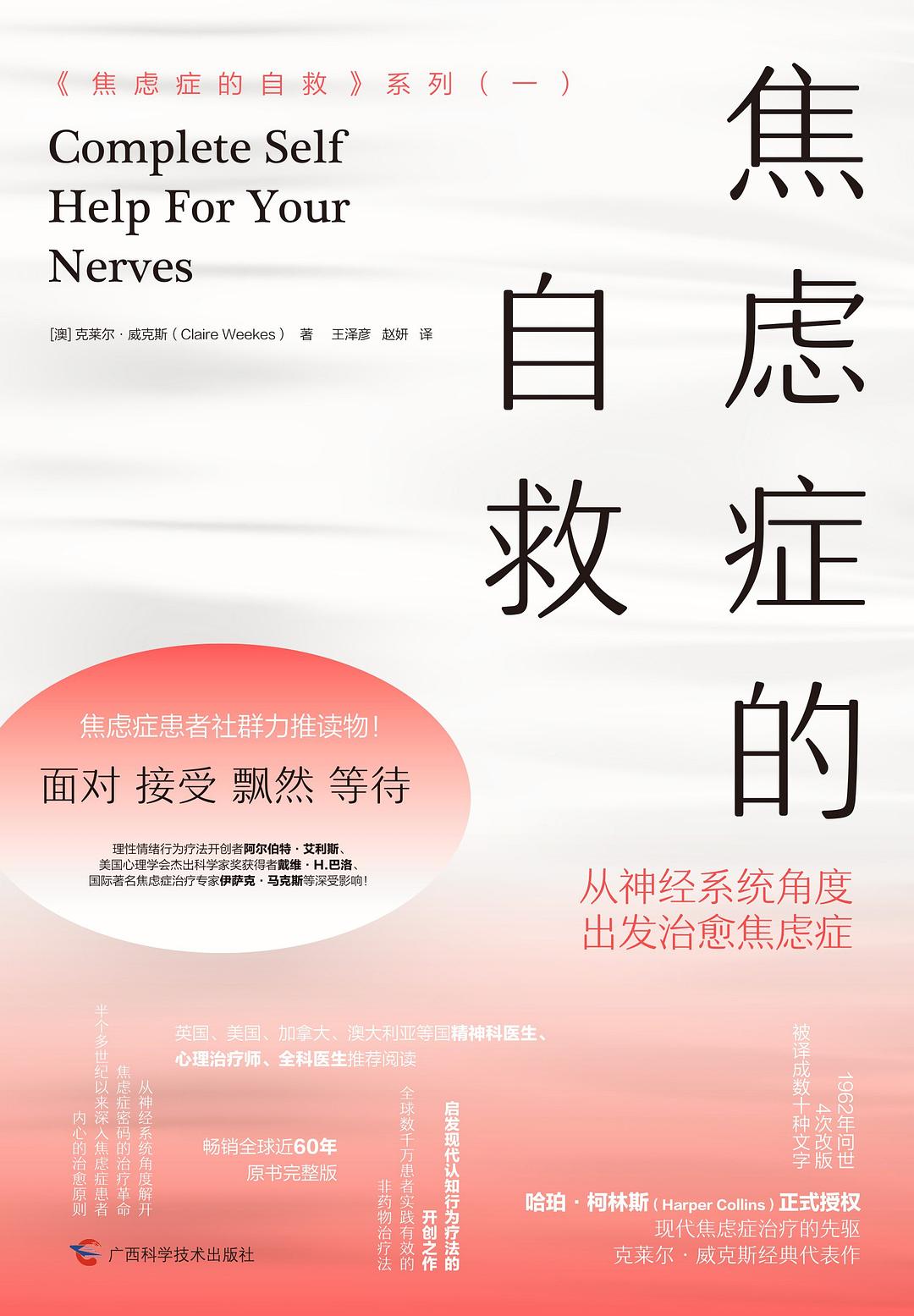WULOLIFE
《焦虑症的自救》作者: [澳]克莱尔•威克斯出版社: 广西科学技术出版社
《焦虑症的自救》作者: [澳]克莱尔•威克斯出版社: 广西科学技术出版社
Couldn't load pickup availability
Description
内容简介 · · · · · ·
☆现代焦虑症治疗的先驱克莱尔•威克斯经典代表作
☆从神经系统角度解开焦虑症密码的治疗革命
☆半个多世纪以来深入焦虑症患者内心的治愈原则
☆启发现代认知行为疗法的开创之作
☆全球数千万患者实践有效的非药物治疗法
☆原书完整版,畅销全球近60年,哈珀•柯林斯(Harper Collins)正式授权
☆1962年问世,4次改版,被译成数十种文字
☆焦虑症患者社群力荐读物!
☆英国、美国、加拿大、澳大利亚等国精神科医生、心理治疗师!
☆理性情绪行为疗法开创者阿尔伯特•艾利斯、美国心理学会杰出科学家将获得者戴维•H.巴洛、国际著名焦虑症专家伊萨克•马克斯等深受影响!
1955主导地位,理性情绪行为疗法也才刚刚被提出,如何仍待研究和发展。长期饱受焦虑症、抑郁症、强迫症等神经症痛苦折磨的患者们,因得不到有效的治疗而濒临绝望。此时,在澳大利亚,一位从业10余年的内科医生早已将自己的理论和临床实践所得投入到神经症,特别是焦虑症的治疗中,来自澳大利亚各地的患者因她得到治愈。
1962年,为了更广泛、更有效地帮助更多患者,克莱尔•威克斯医生写下了她享誉世界的代表作——《焦虑症的自救:从神经系统角度出发治愈焦虑症》。这本书一经出版便引起轰动,上了英国和美国的畅销书排行榜。BBC的电话被打爆,听众来信几乎淹没了BBC的办公室。全世界濒临绝望的患纷纷实践起她的治疗方法,听她的录音带,并在她被邀请参加的电视和电台节目中积极来电,反映自身病症有明显缓解,还将这本书推荐给自己的医生或治疗师。
但在主流心理治疗领域,她的理论和方法由于过于超前而在很年代,随着认知行为疗法的积极发展,她的理论和方法的价值才被广大医生和治疗师正视和承认,逐渐被吸纳进现代心理治疗中。可以说,这是一本从患者中间走入心理治疗主流的著作。
本书是现代焦虑症治疗的先驱克莱尔•威克斯经典代表作《焦虑症的自救》系列的第一部。1962年问世,一经出版便引起轰动,影响遍及英国、美国、加拿大等弌被患者公认是一本对焦虑症的Note:
并开创性地一整套治疗方法。她一面细致入微地描述患者的症状,一面各个击破,引导患者重新认识疾病,学习将她的方法应用于自我治疗中。同时她也你再也不觉得那是问题。
这套对患者来说行之有效的治疗方法,从成书到被心理治疗主流领域实证认可,用了至少20年的时间。而如今,近60年过去,许多关于焦虑症的自助书籍仍在引用书中的文字,威克斯医生的思想精髓也已被现代心理治疗吸收和转化,成为治疗焦虑症的心理学方法的重要部分。
作者简介 · · · · · ·
[澳]克莱尔•威克斯(Claire Weekes,1903—1990)
享誉世界的神经症医生、内科医生,现代焦虑症治疗的先驱,被称为“解开焦虑症密码的女人”。
1930s成为进化科学家。
20 years ago态之后,因悟出“接受会让恐惧平静下来”而最终治愈了自己。也由于这段经历,她开始对神经症产生兴趣,37成为一名内科医生。
在当时的心理治疗领域无法对神经症作出明确解释,她开创性地将神经系统的生理原理与神经症联系起来,一针见血地指出患者根本的致病原因,重拾信心。
首创“面对、接受、飘然、等待”的基本治疗原则,并写进《焦虑症的自救》系列作品里,帮助世界各地的患者学习自我治疗。
如今,她的治疗思想和方法已经成为现代心理治疗的一部分,国际知名临床心理学领军人和精神病学家、美国心理学会杰出科学家奖获得者戴维•H.巴洛评价她:“ 。”
